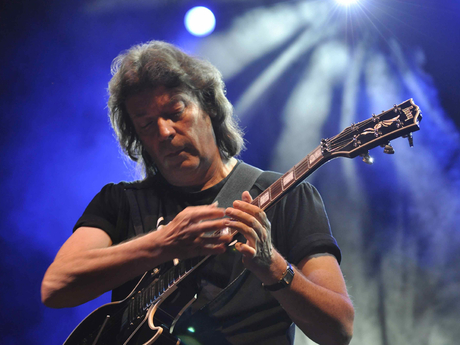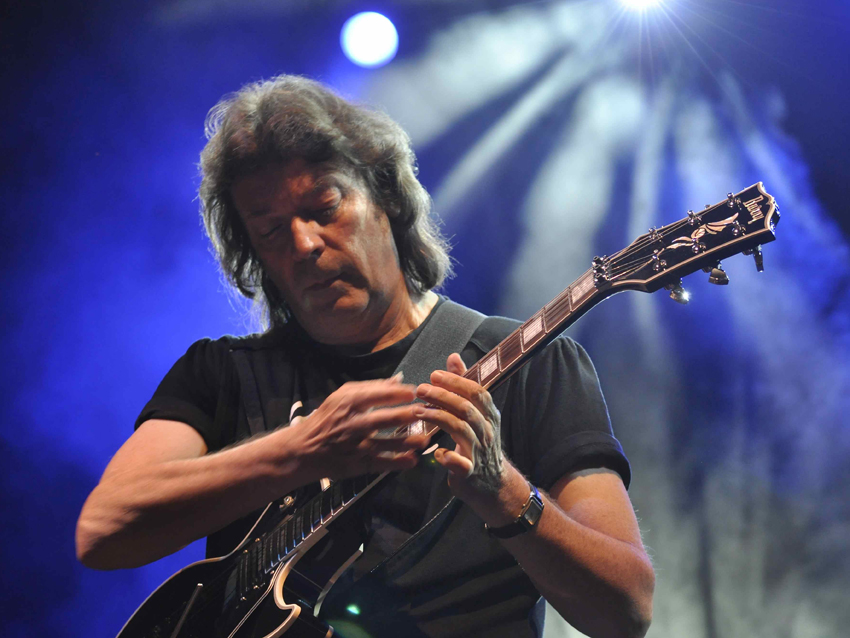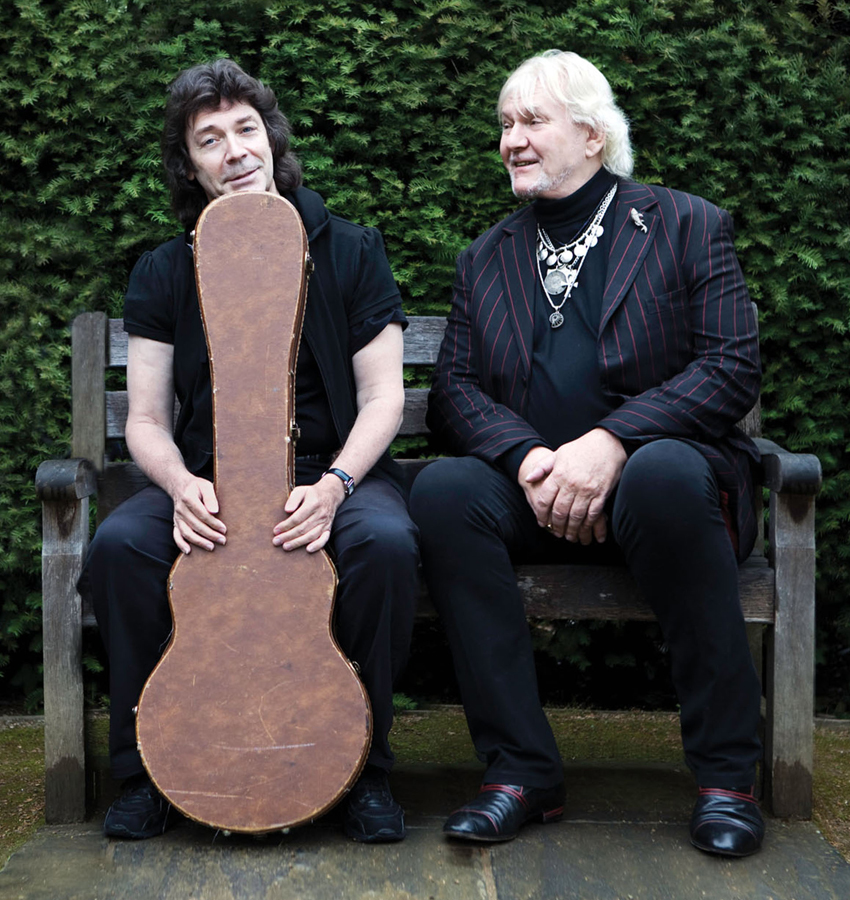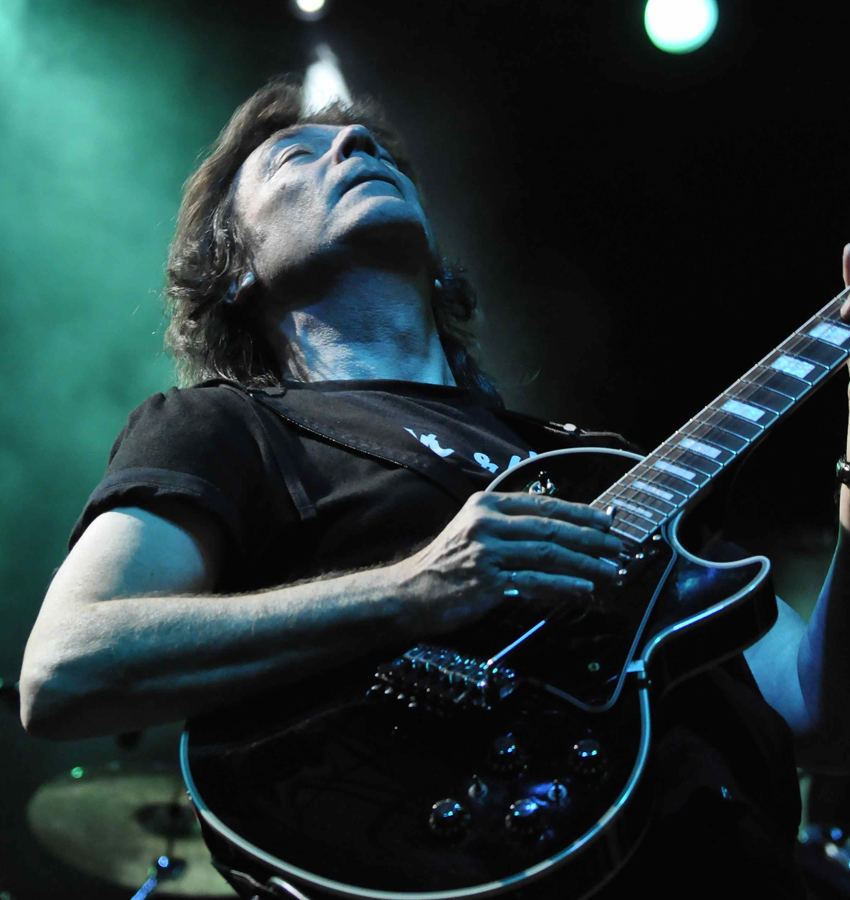

Forty-plus years after he first tapped on a fretboard, guitarist Steve Hackett is still at it. © Tonsoffun (Mario) Rimati / Demot/Demotix/Corbis
Think Eddie Van Halen invented finger tapping on the guitar? Think again. Seven years before Eruption created a new school of shredders, Steve Hackett, then guitarist for prop-rock godfathers Genesis, set aside his pick and applied his index finger to the fretboard of his Les Paul - and he's not afraid to lay claim to conceiving of the technique.
"I'm the inventor of tapping on record," he says. "We haven't found anyone who tapped earlier than me, unless somebody did it in the 1930s, but I doubt it."
While Hackett admits that Van Halen and his followers popularized and expanded on finger tapping, his place as a wholly inventive guitarist, one who also helped introduce players to techniques such as sweep-picking, is assured.
And with progressive rock now more popular than ever with such disparate bands as Dream Theater, Muse and Elbow owning the hearts and minds of fans worldwide, Hackett has teamed up with another godfather of the genre, Yes bassist Chris Squire, for the collaborative project Squackett. But their debut album, A Life Within A Day, might surprise some chops-hungry listeners, as it's rife with melodies and idiosyncratic playing but light on showboating acts of instrumental wizardry.
MusicRadar sat down with Hackett recently to talk about how he and Squire formed Squackett, the guitars and gear he used on their album, whether we'll be seeing a "classic era" Genesis reunion soon and how he tapped into a new way of playing.
"Squackett," huh? What, you guys couldn't think of a better name?"
Want all the hottest music and gear news, reviews, deals, features and more, direct to your inbox? Sign up here.
[laughs] "It was Chris' wife's name. I could think of lots of better things to call ourselves, but Chris insisted on Squackett. Of course, this could work in our favor: With a name like Squackett, we're lowering people's expectations, in which case they might find what we do to be really fantastic. [laughs]
"I never thought The Beatles was a good name either, but then, they never amounted to much. They might have been even better if they stayed with The Silver Beatles? Who's to say they wouldn't?"
Is Squackett a band or a "project"? Do you plan to play live?
"When you start doing gigs, people call you a band. When you make a record, you're a project. That's the difference there. I'm hoping we do shows, although with Chris' schedule and mine - things are quite busy for both of us right now - we'll see. When we do some gigs, we'll be a band."

The prog-rock kings that are Squackett: Steve Hackett and Chris Squire
How did you and Chris Squire hook up? Did you know him socially?
"I met Chris midway through the '80s, when I was working with Steve Howe in GTR. Over the years, I'd seen Yes live, usually once a decade. I always found them interesting in their various incarnations.
"Chris called me late in 2007. He was doing a Christmas album, and he wanted me to play on it. I did, and then I asked him to return the favor, so he's on a couple of my solo albums. One of those albums turned into this project, this band - whatever it is, this thing we have.
"I let Chris have first choice on my material, and I selected things that he had - only a few things were written face-to-face. When we started the album, Chris was living in London. When his wife was expecting their baby, he relocated to Phoenix, Arizona, so a lot of things were flying back and forth across the Pond. We did some things in studios here and there, but a lot of this record was done in the living room of my apartment in Twickenham."
What does your home setup consist of?
"We were using Apple Mac Logic. At the time we were using some Australian Event speakers. I did a lot of the vocals and keyboards at home, and quite a bit of the guitar. Jeremy [Stacey] recorded his drums in his studio. We recorded [singer] Amanda [Lehmann] at her home in Norfolk in East Anglia."
What kinds of guitars did you use on the album? Any of your vintage Les Pauls?
"Well, you know, during my time with Genesis, I tended to use a 1957 Les Paul. Since then, in recent times, I've been using Fernandes Guitars, which have the advantage of the Sustainer system. I do prefer to use a Les Paul shape, so I've got a guitar that Fernandes made for me in the style of a Les Paul Goldtop. They made it for me as a present, so that was very nice. I have a Floyd Rose attached to that, but I use it very little these days - I like finger vibrato."
What about you gear? Do you use any new technology, such as amp modeling software?
"Yes, I do. I use Amp Farm and various other things. So when I record these days, I'm not using my favorite Marshalls - I tend to use those live. I like to record my guitar in a way that I can still maintain a comfortable conversation over anything I'm playing.
"You don't fool yourself with volume when you record like that. Just because you're hearing yourself back loud doesn't mean it's great; in fact, if you record your guitar at a whisper, you might find that what you play is better - and it'll still sound like it's screaming when you listen back to the recording."
Before we get into some of the new songs, let's address the matter of finger tapping. Eddie Van Halen does credit you as having done it first. Have the two of you ever talked about it?
"Eddie and I have never spoken about it, but yes, he has credited me with tapping. When you see old films of Genesis from 1971 on, you can see me using the technique. It's there on many recordings, as well. Eddie is a fine player, of course, and he's the one who named the technique. The important thing is that you play as fast as you'd like, but you do it all on one string - and you have to use a finger from your picking hand instead of the pick."
Between 1971 and 1978, the year Van Halen's first record came out, did you hear anybody else finger tapping?
"No, I'm not really aware of that, I must admit. All I know is that it became part of the language for heavy metal players, and it became one of the glossaries of terms that you can dip into if you're playing electric guitar. You can play it on a nylon-string guitar, of course, or acoustic steel, but it's really going to work best on a electric through an amp with some distortion."
So where did you get? How did you start doing it?
"Well, I'll tell you: I was trying to play a tiny phrase from Toccata and Fugue by Bach, and I was wondering how to do it, because you couldn't really do it across the strings. I figured that if I could do it on one string, then I'd be using the fretboard like a keyboard. There's a couple of techniques I took from Bach, like sweep-picking, which is akin to a violinist rocking the bow across the strings.
"I did it one day, the tapping, but I thought it was a little unwieldy at first because I couldn't play it in time. But then I could play it in time, and I started doing it live with Genesis. This was back in 1971, an awfully long time ago. It enabled me to be the fastest gun in the west for about five minutes, until somebody else came along and did it in a whole new way.
"It's a little bit like Bruce Lee's technique for martial arts: just like he did things so fast that the camera couldn't pick them all up, with tapping, the microphone can't pick up all the notes - it's a blur of music."
What did you think when Eddie burst on the scene with tapping - and when everybody started copying him? Did you say, "Hey, that's mine! I invented that"?
"No, I'm not protective of any techniques. I've learned from every guitarist that I've watched. Everybody plays slightly differently; everybody has been my guitar teacher. I guess I've shown a few moves to some people. A guitar can sound like anything - a harp, even."
The title track of the new album features a very striking guitar solo. Do you plot your solos out, or do you prefer to improvise?
"I would say they're refined improvisation. Sometimes I'll have phrases ready - I'll work them out on a nylon-stringed guitar. I do a lot of things on paper; I tend to write things down. When you're holding an electric guitar and you want to be spontaneous, that's the time to do it. The beauty is, you can always go back and correct what you play if you don't like something."

Working vibrato in Italy, 2011. © Tonsoffun (Mario) Rimati / Demot/Demotix/Corbis
The song Tall Ships has a pretty jazzy feel. For something like that, do you use a different guitar than the Fernandes?
"No, it's the same guitar. The Fernandes is quite versatile. It's like having an onboard E-Bow, something that'll make the strings sustain. That song is a little bit like a piece of trance music."
The distortion on Stormchaser is quite powerful. Are you using amp modeling software on that?
"On that, I use using a Sans Amp. I plugged it straight into the computer. I like to use that for overdrive, even with my Marshalls. But if I want something really screaming, I'll crank up a 50-watt or even a couple of 50-watts. I get one to drive the other - a marvelous sound that. But you can't have anyone near them when you're doing that. They're set on 'stun.'" [laughs]
People will undoubtedly focus on the playing, but the vocals are wonderful. As singers, where did you and Chris meet?
"We took the view that we both liked vocal harmonies. I think a lot of what Chris does is what forms the vocal sound of Yes. He was trained in the choir as a kid, so there's a lot of harmony singing. Luckily, we share a love of that, as well as music that has a lot of detail."
Because the two of you have such incredible prog-rock pedigrees, some might be expecting gonzo instrumentals. But the record is full of tightly constructed songs.
"I think it might surprise people in that we took a melodic approach; not everything we do is based around chops per se. The first track probably shows off our chops, but we didn't want to hammer that home. After you've done that, you've sort of made your point. It's not just about the guitar solos for me. Music that displays a lot of hardware and chops appeals to males, but I've been finding that a lot of the stuff I do attracts both men and women. Long may that reign!" [laughs]
In other words, it's still about getting the girls.
"It's about getting the girls to your shows. What you do with them later is your own concern. But I'm a happily married man, so I don't go there." [laughs]
Going back to your time with Genesis, do you have a favorite record you did with them?
"I was very fond of Selling England By The Pound, which was our album from 1973. I liked it for its quirkiness and certain guitar techniques. I liked my setup then - a Les Paul, an Echoplex, a couple of fuzzboxes and an octave divider. You can do a lot with that. It worked great live and in the studio."
Has there been any new talk of a Genesis reunion, one involving you?
"I've been working on a version of Genesis material that I'm going to take live with some guests. I've always said that I'd be up for a reunion if anyone wanted to do it. They approached me some years back, but it seemed to be far too complicated. As far as I'm concerned, with some of the guys from Genesis saying they're going to retire, I feel that nobody should hold his breath, although I won't be the reason why it won't happen."
Joe is a freelance journalist who has, over the past few decades, interviewed hundreds of guitarists for Guitar World, Guitar Player, MusicRadar and Classic Rock. He is also a former editor of Guitar World, contributing writer for Guitar Aficionado and VP of A&R for Island Records. He’s an enthusiastic guitarist, but he’s nowhere near the likes of the people he interviews. Surprisingly, his skills are more suited to the drums. If you need a drummer for your Beatles tribute band, look him up.
